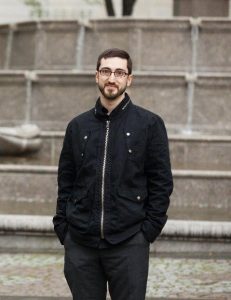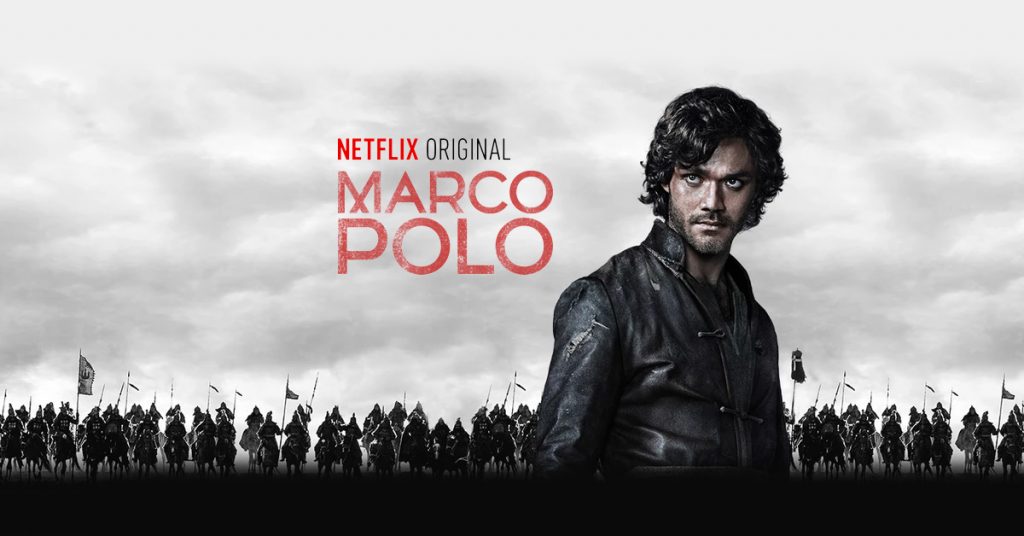The guy who brought you the scintillating “Voyage to Amasia” as a tribute to his grandmother has taken a quantum leap forward in the musical world.
Eric Hachikian is composing the score for a nine-part Netflix series, “Marco Polo,” that carries a budget of $90 million, or $9 million per episode.
The fact that Hachikian is Armenian draws a connection to the historic adventurer whose travels date back to the 13th and 14th centuries. The television series was conceived by John Fusco who explored, followed, and traveled Marco’s journal with his son.
Hachikian was brought into the production to score the series with his long-time friend Peter Nashel.
“Before I was hired, in my initial meeting with John, he asked me about my Armenian background,” Hachikian explained. “Knowing that Marco had traveled the Silk Road, I wanted to include some Armenian-themed music in our audition reel.”
Hachikian knew the first season takes place primarily in Mongolia and China so he wanted to make sure a range was shown. And somehow, author Chris Bohjalian crept into the picture.
“John asked me about Amasia where my grandmother had lived during the genocide, revealing that Bohjalian was a friend of his,” Hachikian pointed out. “From there, I developed camaraderie with John who was the most supportive producer we could ever imagine.”
Fusco encouraged, challenged, and inspired Hachikian and his collaborator to learn the indigenous instruments and transform them into a modern cinematic blend, thus enhancing the dramatic experience.
Included in the score are such Armenian instruments as the oud, kanoun ,and duduk, along with exploring a choir to sing Latin text and the ancient chants for the Christian stories.
“A particularly great thread for us musically this season was developing Ahmad’s Lullaby throughout the episodes,” said Hachikian. “Truthfully, the entire season was epic.”
Each season has ten hour-long episodes. There’s an additional half-hour special detailing the background of the character 100 Eyes. Though the schedule was very similar to a broadcast television show, the depth of story-telling, acting and breath-taking visuals make it seem like scoring a feature film with each episode.
Seasons 1 and 2, as well as the 100 Eyes Special, are now streaming on Netflix.
Netflix is described by Hachikian as a “fantastic streaming, on-demand entertainment service with no boundaries and endless creativity.” Like all of its original content, the entire season is released at once to be watched at the viewer’s convenience.
“Season one happened at a breakneck speed,” Hachikian described. “We were doing an episode every three days. There’s between 30-40 minutes of music in each episode and we were working on multiple episodes at once, developing themes that would be used across multi-episode arcs.”
Season two’s timeline was a bit more reasonable, according to the composer, though still fast-paced, with about a week on each episode. Each episode was spotted with the creative team of producers, directors, and writers who decided where and what kind of music would occur.
“Since the first season’s music was so well received by the team, we generally knew the tone to pursue, but always strived to expand upon that and enhance the scene,” Hachikian pointed out. “Through thematic melodies, counterpoint and instrumentation, we always aimed to have the music help drive and connect the narrative. My feeling is that we advanced the film and very proud of what we’ve done.”
Hachikian’s music has been hailed by the New York Times as “lovely and original.” His compositions can be heard in a variety of motion pictures such as “The Wrestler” and “The Place Beyond the Pines.”
His credits also include “The Mindy Project,” Discovery Channel’s “Life: the Series,” and ABC’s “Mixology and Revenge.”
As creative director and co-founder of Soundcat Productions, a boutique music company with studios in New York City and Los Angeles, Hachikian has written and produced music for numerous national and international ad campaigns, including Apple, Google, Budweiser, BMW, Kate Spade, and Wendy’s.
He has also written for Off-Broadway productions. His compositions have been performed by Los Angeles Philharmonic, New York and Boston Pops Orchestras, and Baltimore Symphony.
A classically-trained composer, as well as a self-taught DJ and perpetual student of world music, Hachikian’s musical instincts have no boundaries. His multi-genre interests result in a unique and personal sound.
Hachikian studied Nadia Boulanger’s methods in Paris. He also studied composition and audio engineering at the Aspen and Tanglewood Music Festivals.
He received his Bachelor of Music with highest honors from the University of Michigan and his Master of Arts from New York University. Also a performer, he plays piano and tuba, is a classically-trained vocalist, and an accomplished conductor.
During his undergraduate studies, Hachikian began exploring his Armenian musical roots. “Voyage to Amasia” was first a piano trio (violin, cello, piano) commissioned by the Prelacy for its 2005 Musical Armenia concert at Carnegie Hall.
Origins of the music extend to his childhood memories with his grandmother Helen Zorigian Shushan to her birthplace in Amasia, now in modern-day Turkey—a place she was never able to visit after her forced exile during the genocide at only 40 days old.
“After my grandmother passed away in 2004, I wrote and presented an Armenian music concert for my graduation recital,” Hachikian recalled. “There is nothing more passionate and symbolic of my Armenian heritage than my grandmother and her triumph over impossible odds. Her strength inspired the music and filled with her stories and memories, this piece was born.”
Randy Bell, a filmmaker friend, was in the audience of “Voyage to Amasia” when it was being premiered and convinced Hachikian to make a real voyage to Amasia and film the experience.
The two spent nearly a month following the route of his family’s exile march from Amasia to Malatya and ultimately to Istanbul, visiting modern-day Armenia while exploring Yerevan and villages settled by Amasia exiles.
The film has the same name and traces a path through the past, honoring Hachikian’s relationship with his grandmother and uncovering what her family’s life in Turkey might have resembled.
It also explores how the events of nearly a century ago continue to strain a relationship between Armenians and Turks.
“Inspired by my family’s story, we embarked upon our own journey in the hopes of finding a greater understanding between two peoples still at odds,” Hachikian noted.
The film premiered in 2011 at the Pomegranate Film Festival where it won Best Documentary. It also screened in Yerevan at the Golden Apricot International Film Festival, won the Jury Award at the Alexandria Film Festival and screened on Capitol Hill.
It has and continues to screen at film festivals, schools and throughout the Armenian community.
Source: Armenian Weekly
Link: Hachikian Score Enhances Netflix Series Marco Polo


